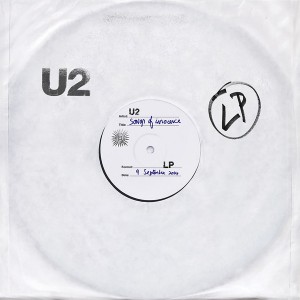Let’s be frank: U2 is nothing less than one of the most successful and popular acts to have ever recorded a rock album. They need no introduction. As such, this review really needs no introduction either. By now you’re probably already sick of hearing about the band’s thirteenth studio album, Songs of Innocence, as well as the uniquely invasive delivery strategy surrounding its release. So allow me to start this review on a personal note: I spent the summer listening to a whole lot of fucking U2. Inspired by “U Talkin’ U2 to Me?” — a not-as-ironic-as-it-seems-at-first fan podcast hosted by Scott Aukerman (“Comedy Bang! Bang!”) and Adam Scott (“Parks & Recreation”) — I’ve devoted the last couple months to exploring the band’s back catalogue, from their 1980 debut LP Boy to their last self-consciously experimental outing, 2009’s No Line on the Horizon. Now, September is here and I find myself blessed with the opportunity to end my Summer of U2 with the band’s brand new album. If that wasn’t enough of a pleasant surprise, the thing is actually good, too.
If the release of Songs of Innocence has reminded me of anything, it’s that a lot of people really, really hate U2. Chalk it up to the band’s often cringeworthingly earnest sound or Bono’s refusal to step down from his soapbox; U2 may be insanely popular, but people fucking despise this band. I don’t. They may not be the greatest rock act in the world, but I think they’ve managed to turn in their fair share of decent material over their almost four decades of being a band, some of which — such as records like their first magnum opus The Joshua Tree and the band’s ironic reinvention Achtung Baby — have rightfully ascended to the position of rock classics.
That being said, it’s been a while since U2 have released anything outstanding. No Line on the Horizon’s respectable attempt at experimentation was marred by the presence of some of the band’s worst songs ever. 2004’s How to Dismantle an Atomic Bomb was a scattershot collection of hits and misses. All That You Can’t Leave Behind found the band kicking off the new millennium with a solid A-side that gave way to a back half that is almost offensively dismissible. Forgotten 90s records like Pop and Zooropa are okay (if you’re into that sort of thing) but that takes us all the way back to 1991 and Achtung Baby — which means that it’s been 23 years since U2 have managed to record a truly impressive album.
If U2 have another masterpiece in them, Songs of Innocence isn’t it. Instead, it’s simply a cohesive collection of personal, catchy pop rock songs that is solid from front to back, and I couldn’t be more pleased to have it. This record is respectable to a fault; it seems like Bono and co. have somehow actually managed to learn from everything that has and — perhaps even more importantly — hasn’t worked for them in the past. Take the record’s first single and opening track for example. While the arrival of No Line on the Horizon was heralded by Bono getting on his “sexy boots” to shout about submarines and gasoline, “The Miracle (of Joey Ramone)” finds the band returning with a big sound but a personal message, comprised of just how significantly music can touch us at impressionable times in our lives. Not only does “Miracle” soundtrack the return of a band who have released their fair share of inspiring music themselves, but it introduces us to an album that is surprisingly free of the Bono-isms that have earned the band’s singer his reputation of being one of the most annoying frontman to ever pick up a microphone.
 Which is not to say that Songs of Innocence is lyrically a great album; to tell you the truth, I haven’t actually given the record’s lyrics too much attention (from what I can gather, they’re fairly personal and surprisingly unoffensive, though). Fortunately, Songs of Innocence succeeds on various other levels. For instance, while I couldn’t begin to tell you what “Every Breaking Wave” is about lyrically, I can tell you that it finds the band functioning at the top of their game in terms of melody and dynamics. After a subdued intro reminiscent of “With or Without You”, the band reach for the heavens with an irresistibly huge chorus that proves to be one of U2’s most spiritually elevating moments since, well, “Elevation”. The band really go for it on this album; perhaps threatened by irrelevance, they’ve recorded some of the most undeniably catchy songs of their career, all while managing to sound more youthful and energetic than they have in decades.
Which is not to say that Songs of Innocence is lyrically a great album; to tell you the truth, I haven’t actually given the record’s lyrics too much attention (from what I can gather, they’re fairly personal and surprisingly unoffensive, though). Fortunately, Songs of Innocence succeeds on various other levels. For instance, while I couldn’t begin to tell you what “Every Breaking Wave” is about lyrically, I can tell you that it finds the band functioning at the top of their game in terms of melody and dynamics. After a subdued intro reminiscent of “With or Without You”, the band reach for the heavens with an irresistibly huge chorus that proves to be one of U2’s most spiritually elevating moments since, well, “Elevation”. The band really go for it on this album; perhaps threatened by irrelevance, they’ve recorded some of the most undeniably catchy songs of their career, all while managing to sound more youthful and energetic than they have in decades.
That sense of youthful energy can probably be accredited to the record’s production. It’s worth mentioning that Songs of Innocence is the first U2 record since 1997’s Pop not to feature production from the likes of Brian Eno and Daniel Lanois, the duo responsible for many of the band’s finest moments. Instead, we’re either treated to big pop sheens and glimmers from Paul Epworth and One Republic’s Ryan Tedder, or the muted colors of Danger Mouse / Brian Burton. This might be the first U2 record to sound like Coldplay since Coldplay started sounding like U2, but the pop treatment actually serves the band well for the most part (“California” actually manages to sound like every good Coldplay single distilled into one track). Still, it’s Danger Mouse who actually manages to take the record’s b-side as an opportunity to push the band into more exciting and experimental territory. If I’m being honest, I haven’t really enjoyed Burton’s production work since his work with Gorillaz and MF Doom back in 2005, but he actually manages to pull some cool tricks out of his sleeve here; “Raised by Wolves” is a car-bomb ballad with some razor-sharp guitar and a drop from Hell and “This is Where You Can Reach Me Now” will have you tapping your foot before you even realize that U2 have gone disco. They’re two of the record’s most esoteric moments, but they’re also two of its best.
If you’ve been drinking the U2 haterade since back when Bono decided to replace four with fourteen, I’m sure Songs of Innocence will do little to change your mind on the band. But if you manage to put all pretenses aside and approach the record with an open mind, I think you’ll be as pleasantly surprised as I was that the record’s title is actually sorta fitting. Pretensions, lyrical blunders, political soapboxing… these songs are innocent of every crime U2 has been accused of in the past. Maybe they’ve finally found what they were looking for after all this time?
Trevor Ikrath has a bachelor's in English and very few ideas of what he wants to do with it. He lives in LA and writes about music like a jaded hipster who can't believe he even has to tell you about this stuff. He's trying to work on it.
